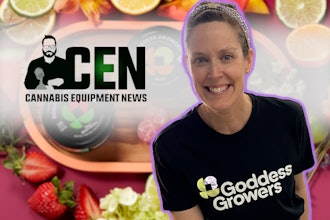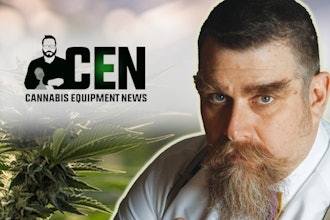Editor's Note: Download the audio version below and click here to subscribe to our newsletter.
This week, Aaron Silverstein, vice president of production and business development at the House of Saka, discusses how he became one of the world's leading experts on cannabis-infused wine — by accident.
Silverstein started as a winemaker, building a niche in dealcoholized wines and selling equipment used in production. During his tenure in the wine industry, he met several professionals in the cannabis sector who needed help making cannabis-infused wines, and he fell in love with the industry.
He helped found the Cannabis Beverage Association, where he serves as president, and in May 2021, he joined the House of Saka to jump into the industry full-time.
Based in Napa Valley, California, House of Saka designs and manufactures infused products that primarily target female consumers.
At Saka, Silverstein is charged with making alcohol-free, cannabis-infused beverages made from select Napa Valley vineyards. The process is challenging.
To start, Saka makes fully alcoholic wine and removes the alcohol using technology similar to that used in cannabis extraction and distillation, including a rotary evaporator. The difficult part is removing the alcohol without losing the flavor: if the liquid is cooked or heated, it will destroy the flavor profile. Saka's process, in effect, spins the wine rapidly until a thin alcohol film forms, which is then removed. The alcohol is processed in seven seconds at 50-degrees Celsius. Although it is impossible to dealcoholize without a loss of flavor, Silverstein says this is one of the best possible processing methods to minimize the loss.
To obtain the THC for infusion, the flower undergoes a series of processes, including extraction, distillation and emulsification, making it water-soluble. Silverstein works with a pair of companies that source the distillate and use it to create stable nanoemulsions.
California law prohibits mixing THC and alcohol, and Silverstein notes that consumers typically prefer the alcohol be removed from the wine, because few people enjoy mixing the two. In his research, the only exception is a segment of beer consumers who like the two substances in tandem.
The team goes to great lengths to preserve the flavor, but the experience is different than edibles and alcohol. The THC is absorbed through the tongue, which provides a rapid onset time of 15 to 20 minutes. Traditional edibles range from 90 to 120 minutes. Coming down is unique as well; the high only lasts from 90 to 120 minutes. The idea is to create a way to have an edible and enjoy it in a shorter window — like having a drink, while skipping the hangover and calories.
Manufacturing
House of Saka partners with a contract manufacturer to make the product, a common strategy in the beverage industry that helps offset the cost of expensive processing and bottling equipment. However, Silverstein says it's sometimes tricky to find a manufacturing partner, because very few licensed facilities can handle beverages.
To be considered a non-alcoholic beverage, the wine needs to come in under 0.5% alcohol by volume. Of course, the lack of alcohol creates challenges with refermentation, but Silverstein employs quality control and filtration practices to keep microbes out of the bottle. Typically, this isn't a problem for winemakers since the alcohol keeps the microbes at bay, but it's crucial because they could make the beverage stronger and change the flavor.
Labeling & packaging xhallenges
Napa vineyards are excited to be a part of Saka's infused-wine project; it's innovative and different. However, California has strict labeling regulations that prevent Saka from mentioning the famed wine epicenter anywhere on the bottle. When cannabis was legalized in the state, infused beverages weren't on the radar. Right now, they get lumped in with edibles when it comes to labeling.
One problem Silverstein faces is that to use the name of any county on any cannabis product, 100% of the cannabis in the product has to be sourced from that county. The distillate isn't sourced from the county because it's illegal to grow cannabis in Napa Valley, so the rule prevents House of Saka from saying that the product is manufactured in Napa Valley, created with wine from the area or even listing the company's address on the bottle.
As president of the Cannabis Beverage Association, Silverstein is actively working on changing the regulations. Beverages only hold about 2% of the California cannabis market, but the category has grown 100% year-over-year.
Being associated with edibles presents additional packaging problems. While it makes sense for cookies, chocolates and brownies to require opaque packaging as a child-proofing preventative measure, it doesn't make much sense for beverages, according to Silverstein. As a result, Saka can't use clear or green glass bottles and is limited to brown glass bottles. Saka also can't use the term "wine" or "dealcoholized wine" on the label, so Silverstein is left with little more than using the shape and form factor of a wine bottle and hoping consumers make the connection.
Silverstein previously worked as the managing director at non-alcoholic beverage manufacturer BevZero, where he led the development, manufacturing and commercialization of more than 20 different cannabinoid-infused wines.
As president of the Cannabis Beverage Association, Silverstein talks to politicians to educate them on cannabis-infused products. While House of Saka's infused wine is currently only available in California, it will likely start rolling out in at least two other states by the end of the year.
Please make sure to like, subscribe and share the podcast. You could also help us out a lot by giving the podcast a positive review on Apple podcast or whatever platform you use. Finally, to email the podcast or suggest a potential guest, you can reach David Mantey at David @cannabisequipmentnews.com with “Email the Podcast” in the subject line.






















